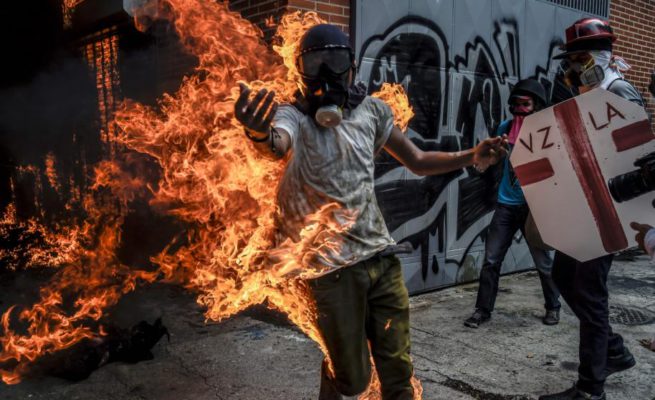Venezuela seems to have fallen into the circles of Dante’s Inferno. The air of its cities has become less and less breathable as police and the Guardia Nacional Bolivariana launch tear gas ad libitum on a population that has taken to the streets due to despair, and that remains on the streets despite the 38 dead —almost all of them very young— who have fallen victim to the violent as well as desperate repression.
Increasingly, Venezuela resembles the bloody dictatorships of the last century, which we believed interred in history books. No further disguise is possible. The last bit of a sadly empty democracy makeup fell down a month ago, when, through a very awkward political move, President Nicolas Maduro —with the connivance of the Tribunal Supremo de Justicia— tried to also concentrate in his hands the legislative power, which, no matter what, he had failed to disallow completely. The king appeared entirely naked.
The dismantling of the autonomy of the branches of power had begun long ago. Using a formula that the extremes of political right and left have always shared, i.e., leader-military-people, the late President Chávez started it. The leader is the leader, legitimized by the people and defended by the military. It is no wonder that Chavez used so much the slogan: «With Chávez, the people are in command». Institutions become facades behind which only a vacuum remains.
The disastrous economic situation inherited by Chavez’s dolphin Nicolás Maduro, coupled with the vertical fall of oil prices, fueled the avalanche of disasters that has hit Venezuela. A population that seemed ready to endure everything in silence has said «enough», and has come up with a courageous, serious and deeply democratic protest. Young and not-so-young men have overcome the barrier of fear: the idea of again suffering in silence the hardships of the lack of food and medicines scares them more. Worse is the fear of being killed any day at the hands of an overflowing crime that has forced the whole society to impose on itself a curfew as soon as the first shadows of the night fall on the different cities of the country.
The courage of an increasingly broader opposition is achieving important results: it has forced out of its comfort zone an international diplomacy always reluctant to take a stand on Venezuelan affairs, it is creating deep fissures in Chavismo, and it is sowing panic in a government that, seeing itself ever more isolated, without a checkbook to buy consensuses, accumulates serious errors in its desperation. The merciless use of the force of weapons allows it to fear less national chaos than it fears international isolation; particularly, on the eve of having to face, with empty coffers, new foreign debt maturities. In a desperate attempt to legitimize illegitimacy, Nicolás Maduro pulled from his hat the call to a «Communal Constituent Assembly»: a maneuver that, on top of being unconstitutional, can further alienate large sectors of Chavismo who do not want the Chavista Constitution changed.
It is an iron fist that can still last a long time and take more lives. And this is why we need that international pressure come to grow, and that rejection becomes a chorus of voices involving a growing number of international organizations and countries.
Venezuela needs to rebuild its democracy through reliable elections, the recognition of the National Assembly’s legitimacy, and the release of political prisoners, whose numbers increase instead of diminishing. There will have to follow an inevitable process of transitional justice, so that a country that is falling apart may be rebuilt little by little.
The many of us who live abroad bear the great responsibility of accompanying as much as we can our fellow Venezuelans who struggle for democracy from within. Of no help however are the voices of those who, from the bitterness and despair of a forced remoteness, fail to recognize the electoral route as the only possible way to restore peace, and mend the deep wounds that afflict a society that will need to coexist in the same territory.
Photo Credits: El País


